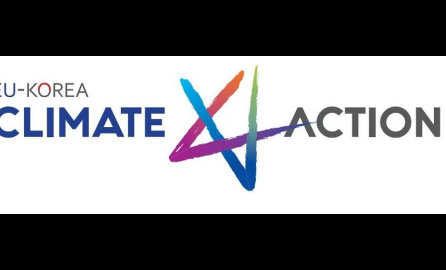Event 2: Green Finance for Sustainable and Clean Energy
The Climate Action Team co-organized a webinar on green finance with the British Embassy, Embassy of Canada, EU Delegation to Republic of Korea and the Energy Transition Forum (ETF) on 27 January 2021. The purpose of the webinar was to share financial strategies for sustainable energy transition in the EU, UK and Canada and the current status of green finance policies in Korea.
Caroline Wellemans, Deputy Head of the Directorate-General for Financial Stability, Financial Services and Capital Markets Union (DG FISMA) and Helen Wildsmith, Coordinator of the PPCA Finance Taskforce were invited as EU speakers. Hyung-na Oh, Professor of Kyung Hee College of International Studies, Hyoung-kun Park, Financial Institution Specialist of Green Climate Fund, Jong-o Lee, Executive Secretary of Korea Sustainability Investing Forum, and Dong-hoon Lee, Director of Financial Services Commission participated as panelists. Chun-taek Rim, President of the Korea Institute of Energy Technology Evaluation and Planning was invited as the moderator for the QnA and Discussion Session.
Helen Wildsmith informed on the background of the Powering Post Coal Alliance (PPCA) as a coalition of national and sub-national governments, utilities, financial institutions and other organizations under the purpose of advancing a transition from coal to clean energy. She explained PPCA’s three financial principles to accelerate the transition in their financial services, advocacy, and investment activities, which are: no new financing for coal into the system; use advocacy to phase out the existing coal plants; encourage investment managers to offer appropriate products to asset owners and asset owners to select those products.
The second presentation was delivered by Caroline Wellemans who covered the EU’s sustainable finance strategy. She explained that the EU’s strengthened 2030 climate targets increased the required level of the investment in energy to 350 billion EUR annually during 2021-2030. The European Commission had to develop new investment plans including the sustainable financial strategy to enhance the EU taxonomy, propose EU green bonds, and assess suitability of capital requirement for green assets. However, she emphasized further actions are needed at a global level in order to reach the Paris Agreement objectives by 2030.
The Q&A session started after the presentations. Questioned about policy measures to encourage information disclosure in the EU, Caroline Wellemans explained that the EU already established the non-financial reporting directive which is currently under revision to improve the gaps in comparability and pertinence of the data and reliability. Helen Wildsmith was asked whether public institutions are still necessary to lead green finance even in the economically developed countries. She said that the public sector is still playing an important role in building investment infrastructures and all parties should be involved in the process of fighting against climate change.
Afterwards, four Korean panelists participated in the discussion session following the Q&As. Hyung-na Oh from Kyung Hee College pointed out the obstacles to enforce green finance in Korea and suggested a few solutions such as ensuring transparency and long-term predictability when developing green taxonomy and energy tax adjustment to align energy cost with the price.
Hyoung-kun Park from Green Climate Fund informed on six key elements of the Korean legislation on green finance proposed at the National Assembly in November 2020.
- Besides the role of Financial Services Commission (FSC), the role of the Financial Supervisory Service and the Bank of Korea is emphasized in screening and managing climate risks in the financial industry.
- The Ministry of Environment and Financial Services Commission continuously update the green taxonomy.
- The Green Financing Plan should be established and FSC shall disclose the plan every three years.
- The financial institutions must build the system which promotes the green finance in accordance with international standards and disclose the information regard the organization’s structure, evaluation on environment and social impact, etc.
- Provide incentives to promote green financing (e.g. green bond with tax incentives).
- Establishment of Green Finance Authority.
Jong-o Lee from Sustainability Investing Forum discussed the strategy for coal-free depository in Korea, which is aimed at encouraging municipal governments and the office of education to consider a few more aspects in selecting their financial institutions, such as their investment status in coal and plan for phasing-out. Lee said this method would nudge financial institutions to move towards green investments instead of giving them direct pressures.
Dong-hoon Lee from the Financial Services Commission spoke about the current situation and strategies to accelerate green finance in Korea. He shared three important tasks to be done by the FSC as below.
- Develop Korean green taxonomy in coordination with the Ministry of Environment to support public and private financial institutes in implementing green finance.
- Develop statistical systems on the green investment that can be used jointly by public and private sectors.
- Develop tools to analyze the climate risks of carbon-intensive industries and therefore to minimize the impact on the society and financial sector.

